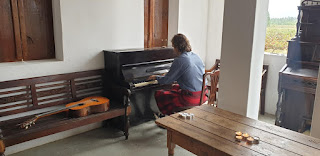Thursday, January 20, 2022
Spending and Earning
Monday, August 02, 2021
See the Value
Tuesday, January 12, 2021
Decision Maker with Money
My first job after university was in Risk Product Development. My focus area was Earning Ability. Money is made by solving problems for decision-makers with money. In a hand-to-mouth economy, without capital-backed decision-making, you only get to make decisions on how to spend money if you have earned it from another decision-maker. First, you have to find a job. Then you have to do a job. Then you gradually get breathing space if you get paid more than you need to spend. When you venture into the land of discretionary (by choice) spending. Then you can either consume that money or put it to work. To start, you are at risk. Unless you have someone to turn to, there is the danger that something goes wrong, and you cannot work. Something goes wrong, and you cannot do your daily tasks. Something goes wrong, and you cannot do the work you were trained to do. Or you cannot do any work. The question “How much capital would I need if I couldn’t work?” is the starting point for the target size of the Engine you need to make your own decisions. Until then, something might go wrong.
Tuesday, December 01, 2020
Becoming Accustomed
Pause before you look at people who are richer than you to learn about money. If you want to create a buffer for the noise. If you want space to breathe, then the best place to look is how you spend money. How could you live on half of what you spend? The best place to learn is from people who are living on half of what you are. The key to stilling the waves of money anxiety is the relationship between income and expenses. The ins and outs, and the balance between the two.
Someone who is earning a lot of money, but spending even
more, will be progressively getting more into debt. Making it increasingly hard
to reduce their expenses. Becoming accustomed to a lifestyle they can not
afford. Even if their income is growing, they are not on the path to financial
freedom. They are going to be stressed, and full of money anxiety. Whereas
someone who is earning half of what you do, can offer you lessons on how to
gradually build up a buffer.
Monday, September 28, 2020
The Space Between
Earning £100,000 a year can still be filled with anxiety if you are spending £120,000 a year. If you are living on the edge of your capacity to borrow and pay interest. If you are pushing forward and up as hard and as fast as you can. Earning R100,000 a year can be Zen-like if you have the self-discipline of a Langa Gogo, spending R80,000 a year a putting some to work. Those are extremes, but the point is the only comparison necessary is spending and income, and the space between. Not other people. Vrittis, are the thought waves of the mind. Yoga creates a system to control these waves. A path of self-restraint that brings focus to the things that are most important. Creating the ability to move with intention, rather than being moved by what the world throws at us.
Friday, September 25, 2020
Being Played
A Grudge Purchase is something you feel you have to buy, rather than something you want to buy. When you do your planning of how to spend your income, Discretionary Spending is what you do with what is left over after your needs are met. Clearly not everyone considers the same things either reasonable, necessary, desirable, or pleasurable. Often the best place to learn about financial planning is not from people with twice as much as you, but from people with half as much who still seem to come away with something extra. The delusion we have is that more coming in solves the problem. What really controls the financial waves is the relationship between what comes in, what goes out, and how much autonomy you have over the difference. That is the difference between playing and being played.





